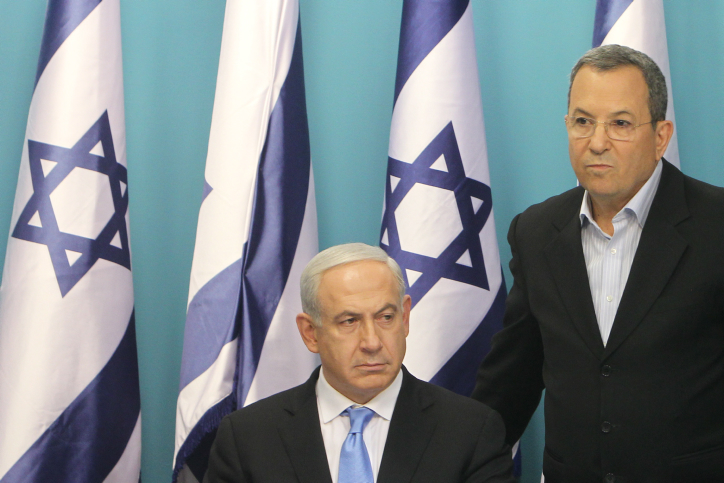Israel was established and continues to exist in a mentality of constant war. Our racism is only a symptom.

One of the most influential institutions in Iranian politics is the Guardian Council. Among its many roles, the Council filters out presidential candidates, deciding who can and who cannot run in the elections. It even has the power to disqualify former presidents, such as Mahmoud Ahmadinejad, from running again. And as befits a religious dictatorship, its considerations are far from democratic.
And yet, after Ehud Barak announced his return to Israeli politics last week, I couldn’t help but envy the power of the Guardian Council. While the Iranians have a turnover of their own failed or corrupt leaders, we seem to be stuck in the endless loop with our own figureheads.
Barak’s re-entry into politics helps clarify the choice that Israelis are facing in the upcoming elections: militarism or racism. On the one hand we have a right-wing camp headed by Netanyahu, who over his 10-year rule has institutionalized racism against the Palestinian public. On the other hand, we have the “anyone but Bibi” camp, headed by the generals of Blue and White and Ehud Barak’s new party, respectively.
It is true that both camps are rife with militarism and racism: much of Netanyahu’s political capital was built on the back of his brother, Yoni, who was killed while commanding an elite IDF unit during Operation Entebbe in 1976. On the other hand, the general’s camp derides Palestinians, and its refusal to join forces with the Palestinian parties has contributed to the incitement and delegitimization of the Arab public writ large.
The difference between the two camps is the ratio between the two components and the kind of discourse with which they are associated: Netanyahu is seen as promoting a kind of shameless, folksy racism, while the generals peddle a hawkish security-based discourse.

We intuitively tend to scorn the blatantly racist discourse more than the militaristic one, perhaps because the latter is more transparent to us. But in my view, Israeli society’s entrenched militarism is actually the more difficult disease to treat, both in terms of diagnosis and prognosis.
The truth is that in the current Israeli reality, the two seem to us indistinguishable. Israeli children get a healthy dose of both racism and militarism from a young age, from the moment they are drafted into the ranks in kindergarten, preparing care packages for soldiers before they can even read. It is around this age that they first hear and internalize anti-Arab racism. Eventually, years down the line, they will attend a pre-military boot camp and pretend they are soldiers for a few days. Before they know it, they will be joining the IDF to fight the “terrorists,” a term that has always been used as a euphemism for “Arabs.”
Yet despite the deep reciprocal relationship between militarism and racism in Israel, the former precedes the latter, and therefore is the more dangerous of the two. After all, militarism is precisely the point from which this vicious cycle springs.
Israel was established and continues to exist in a mentality of constant war. War has always been a matter of fate here, and it is precisely this state of mind that creates a totalizing victimhood mentality that suppresses any moral instinct we may have and lays the groundwork for the oppression of another people. Should that people rise up against its oppression, we will use even more severe violence in response. To justify that oppression, we must delegitimize the so-called enemy and develop a racist mentality toward anyone who resists.
Of course, this requires Israelis to unquestioningly worship the army as the main instrument that sustains the entire system. It is precisely this kind of worship that creates a blind admiration for generals; of course we trust them when the army is the foundation upon which our very existence here depends. Our blind trust in those who wear the uniform is then translated into the realm of politics. If our security is in their hands, why shouldn’t they also be the ones to determine our policies?

We decry military coups in neighboring countries yet continue to flock after the next savior who dons a uniform. Meanwhile, we debate whether to support the general who boasts of sending Gaza back to the Stone Age or the one who trampled over whatever remained of the trust of Israel’s Palestinian citizens during the Second Intifada, allowed for the murder of Palestinian demonstrators, and introduced the notion that Israel has “no partner for peace” into our national lexicon.
The Israeli peace camp is pinning its hopes on white men in uniforms with lots of blood on their hands. We manage to convince ourselves every time that they will bring about a change. It must happen this time around, we say.
But it won’t happen this time either, since we have no reason to put an end to our mentality of eternal war. Until this happens, the cycle will never cease. This is not a matter of fate or a force of nature — it is a conscious decision we make every single day. The moment we decide to change our fate, the change will come easy. That choice, however, is nowhere on the horizon — all we see is Netanyahu, Gantz, and Ehud Barak.
This article was first published in Hebrew on Local Call. Read it here.

